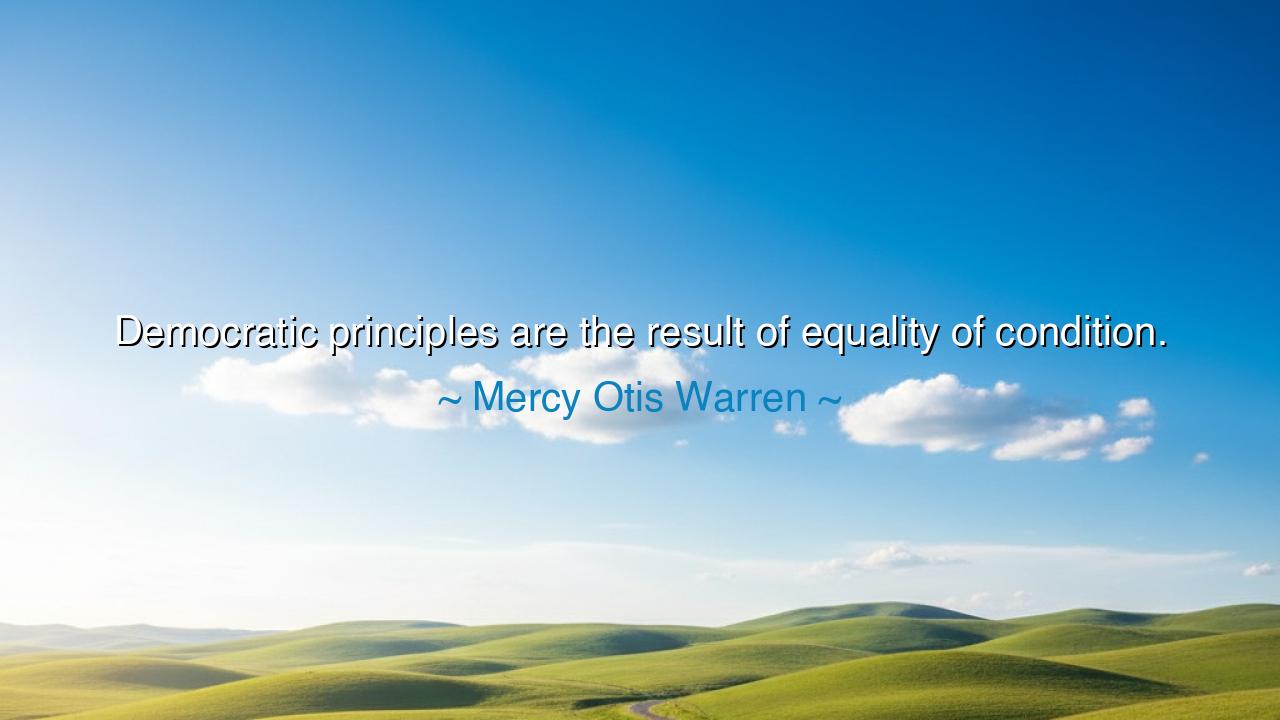
Democratic principles are the result of equality of condition.






The patriot and poet Mercy Otis Warren, who with her pen defended liberty in the days of America’s birth, declared with piercing clarity: “Democratic principles are the result of equality of condition.” In this truth, she reveals the sacred bond between freedom and fairness. For democracy cannot grow in soil where inequality reigns. If some are exalted above others by birth, wealth, or privilege, the tree of democracy withers, its roots choked by injustice. But where there is equality of condition, where every soul stands with dignity recognized, there the principles of liberty take root and flourish.
In Warren’s time, the American colonies shook off the chains of monarchy and declared themselves free. Yet even as they cried for liberty, she saw the danger: that without equality of condition, their new democracy could rot from within. If power remained in the hands of a few, if the voices of women, the poor, and the enslaved were silenced, then “freedom” would be but another mask for tyranny. She understood that true democracy is not the mere casting of votes, but the leveling of conditions so that no citizen is crushed beneath another’s heel.
History proves her wisdom. Consider the French Revolution. In 1789, the common people rose against kings and nobles who lived in splendor while peasants starved. They demanded not only bread, but equality of condition—the chance to live with dignity. From this soil, democratic principles emerged: the cry of liberty, equality, fraternity. Though the revolution later descended into violence, its roots showed the truth of Warren’s insight: democracy does not arise in luxury, but in the shared recognition that all deserve the same chance to live free.
In contrast, where inequality of condition prevails, democracy falters. The ancient Roman Republic, for example, began with noble ideals of shared power. Yet as wealth concentrated in the hands of a few patricians, and the poor were left landless and desperate, the republic crumbled. Civil war followed, and liberty was lost. Thus, Warren’s words echo across time: democratic principles cannot survive in the shadow of vast inequality.
But Warren’s teaching also carries hope. For when societies strive toward fairness—when education is opened to all, when justice is applied without bias, when resources are shared more equitably—then democracy grows stronger. The people trust one another more; voices rise not in envy but in harmony; governments serve the whole instead of the few. Equality of condition is not about sameness in wealth or station, but about ensuring that every citizen begins with dignity, and none are condemned to despair by birth alone.
The lesson for us is clear: if we wish to preserve democracy, we must guard against the monsters of inequality. Do not imagine that liberty can survive if vast numbers are silenced, impoverished, or disregarded. True freedom demands constant vigilance to lift the low, to check the proud, and to weave a fabric of society in which all can stand upright. Without such labor, democracy decays into oligarchy, and the dream of the people’s power is lost.
Practical wisdom flows from this: support policies that widen opportunity, not hoard it. Defend education for all, for knowledge is the foundation of liberty. Insist upon justice that does not bow to wealth or privilege. And in your daily life, treat each soul you meet as an equal citizen in the great republic of humanity. For democratic principles are not sustained by governments alone, but by the hearts of the people who live them.
Thus, let the words of Mercy Otis Warren endure as a guide for every generation: democracy is not a gift handed down from rulers, but a harvest grown in the field of equality. Guard that field, nourish it with justice, and it will yield freedom in abundance, for yourselves and for the generations yet unborn.






AAdministratorAdministrator
Welcome, honored guests. Please leave a comment, we will respond soon